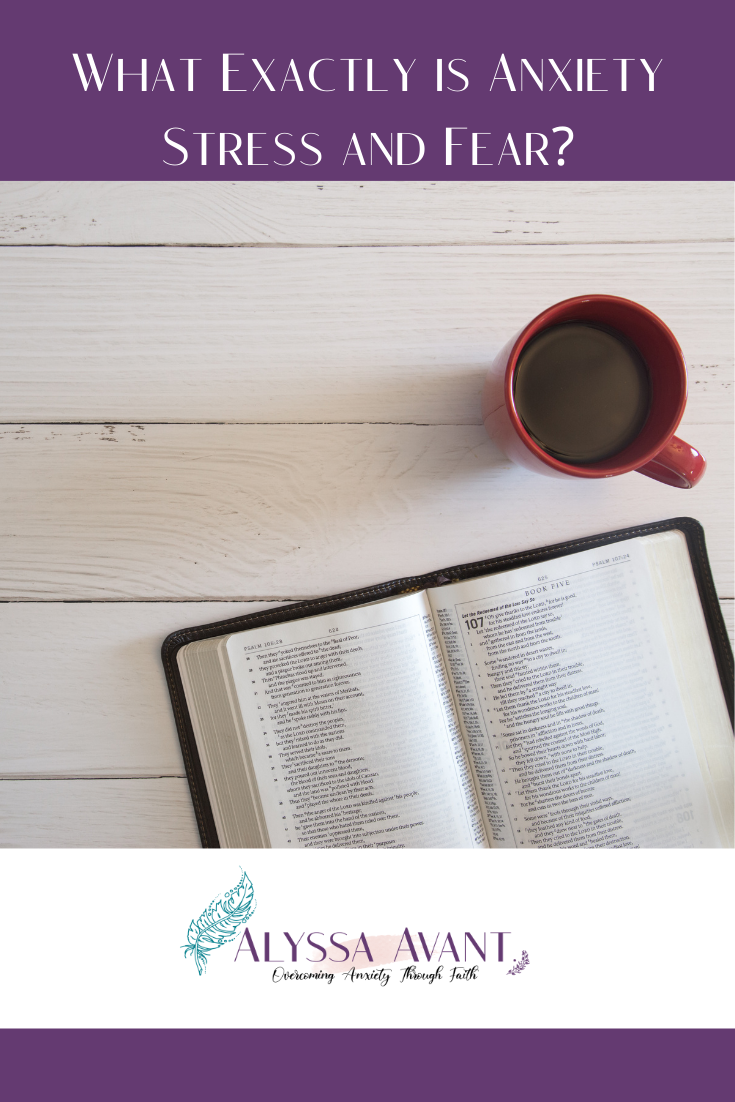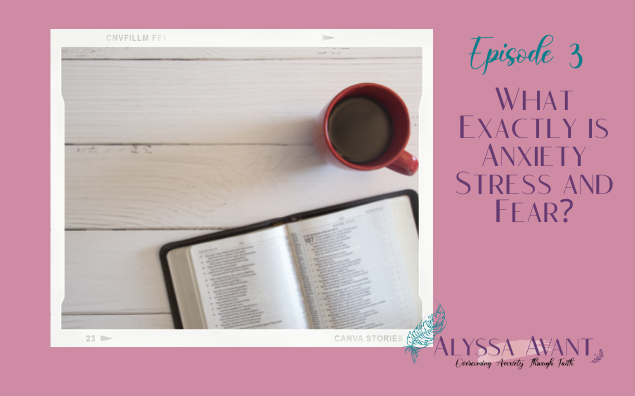Have you ever dealt with negative or worrisome thoughts that you just can’t seem to shake?
Have you ever felt like your heart was racing or your insides were shaking?
It is possible that you might be suffering from anxiety.
That’s what this podcast episode is about, the difference between anxiety, stress, and fear, as well as how I have used the process of prayer journaling to overcome my anxiety through faith.
Anxiety, Stress and Fear
I have suffered from anxiety and panic attacks since I was a small child. As a small child, thunderstorms were a source of anxiety for me. As a teenager and young adult, I became anxious when I had to visit a new place or encounter a situation that I had never experienced before, such as a new college campus. In my adult years, conflict and financial woes have made me the most anxious.
No matter what causes your anxiety, it is important to find ways to help you deal with your anxiety. Though I have had anxiety and panic attacks over different issues in different seasons in my life, I have always needed to find ways to deal with them.
We all have had a time in our lives when we have experienced anxiety, stress, or fear, but the three experiences have differences. Let’s look at the definition of each to discover their similarities and differences.
Anxiety – a feeling of worry, nervousness, or unease, typically about an imminent event or something with an uncertain outcome.
Fear is a synonym of anxiety.
Fear – an unpleasant emotion caused by the belief that someone or something is dangerous, likely to cause pain or a threat.
a mixed feeling of dread and reverence.
“The love and fear of God”
Stress – a state of mental or emotional strain or tension resulting from adverse or very demanding circumstances.
“he’s obviously under a lot of stress”
I would venture to guess that we’ve all experienced one or all three of those things. Obviously at times both fear and anxiety are helpful to us, keeping us from making poor decisions or protecting us from harm.
As the great Billy Graham says – “Historians will probably call our era “the age of anxiety.” Anxiety is the natural result when our hopes are centered in anything short of God and His will for us.”
The funny thing is Billy Graham wrote those words in 1965, but they are still true for us today, maybe even more so true today.
Some things to consider about all three of these things are how they affect our relationship with God. I have found this to be true in my life, so I am sharing this from experience.
The first thing to consider is that anxiety, stress, and fear can distract us from our relationship with God.
As the Bible states in Phil. 4:6-7,
Do not be anxious about anything, but in every situation, by prayer and petition, with thanksgiving, present your requests to God. 7 And the peace of God, which transcends all understanding, will guard your hearts and your minds in Christ Jesus.
He even instructs us and tells us exactly what to focus on instead in the next couple of verses, Phil 4:8-9,
Finally, brothers and sisters, whatever you have learned or received or heard from me, or seen in me—put it into practice. And the God of peace will be with you.
We aren’t the first people to deal with anxiety, fear, and stress. The Bible mentions all of these things in different forms.
You might remember the story of Esther. In Esther 4 the Jewish people were anxious because of a royal decree that had been set that said they were going to be killed. However, Esther was working to save them. She too was anxious as she was risking her life on behalf of her people. Fear of death and the unknown is a key element of anxiety.
This is why not all anxiety is sinful, but we do know that God tells us in Matthew 6 to not worry about the necessities of life. These are probably the verses that stick out in our minds when we think about what the Bible says about anxiety or worry.
Matthew 6:25-34
“Therefore I tell you, do not worry about your life, what you will eat or drink; or about your body, what you will wear. Is not life more than food, and the body more than clothes? Look at the birds of the air; they do not sow or reap or store away in barns, and yet your heavenly Father feeds them. Are you not much more valuable than they? Can any one of you by worrying add a single hour to your life?
“And why do you worry about clothes? See how the flowers of the field grow. They do not labor or spin. Yet I tell you that not even Solomon in all his splendor was dressed like one of these. If that is how God clothes the grass of the field, which is here today and tomorrow is thrown into the fire, will he not much more clothe you—you of little faith? So do not worry, saying, ‘What shall we eat?’ or ‘What shall we drink?’ or ‘What shall we wear?’ For the pagans run after all these things, and your heavenly Father knows that you need them. But seek first his kingdom and his righteousness, and all these things will be given to you as well. Therefore do not worry about tomorrow, for tomorrow will worry about itself. Each day has enough trouble of its own.

Another example from God’s word that I am reminded of often when I think of fear and anxiety is the story of Jesus and the disciples in the boat during a storm. The disciples easily became distressed because of the storm, but Jesus remained calm. He even rebuked them for their lack of faith, but he also rebuked the wind and the waves. One thing that we must always remember is that as long as Jesus is there, there is nothing to fear.
We will talk more in future weeks about how anxious thoughts enter our minds, but today let’s look at how journaling can help us to deal with anxiety.
One of the ways I have learned to deal with anxiety over the years is through prayer journaling. Prayer journaling, the act of physically writing out your thoughts and prayers can help you to:
Focus on your blessings,
Find the silver linings and
See God’s hand working in your life.
It can help you to feel safe. It can help you to stay connected to God, the ultimate physician who will always take care of you.
Prayer Journaling Techniques to Help You Deal with Anxiety
Prayer journaling is easy. After all, what you are writing is simply your prayers in written form. There are a couple of ways that I wrote out my prayers – –
Making a list. Journaling your prayers can be as simple as making a list or several lists. You might choose to write a list of things that you are grateful for, which will help you to focus on your blessings and find the silver linings. You might also choose to write out a list of things that you are anxious about in order to give those things over to God in prayer. Another possible list to create is a list of other people whom you want to pray for as well.
Freewriting – Freewriting is writing things out as they come to mind. There doesn’t have to be a reason or order for these thoughts. You record your thoughts, prayers, and worries without worrying about grammar or if what you are saying makes sense. God will understand either way.
Letterform – Another way that I have enjoyed writing out my prayers is to think of them as writing a letter to God. Just like you would write a letter to a friend you share your worries, thoughts, and prayers with God through a written conversation.
Prayer journaling can help to lessen the feelings of anxiety and worry by getting the thoughts out of your head and onto paper. You will find that there is something extremely freeing and relieving about doing so. You will want to be sure that you also go back and read your prayers from time to time and take time to record where God has answered those prayers. This is probably the best part of using a prayer journal is the ability to see and record God’s answers to your prayers.
Remember, no matter if you choose to make lists, free write, or write a letter to God prayer journaling can help you to overcome anxiety.

